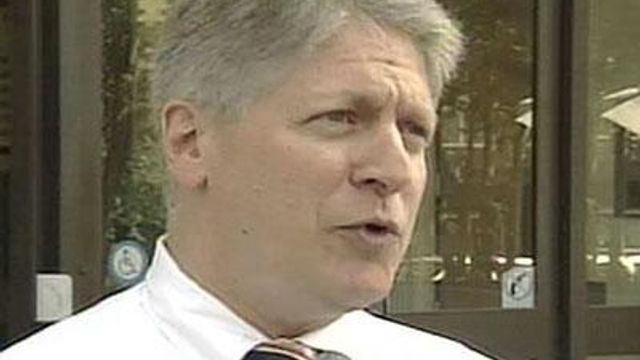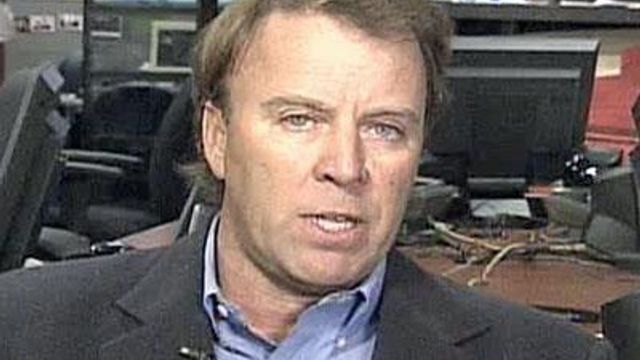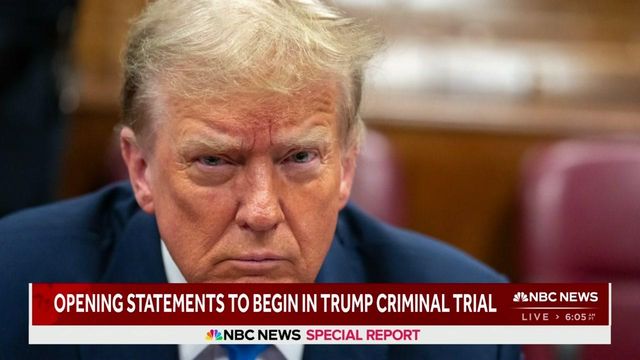Local News
Nifong Asks for Special Prosecutor in Duke Lacrosse Case
Durham County District Attorney has asked for a special prosecutor in the Duke lacrosse case.
Posted 2007-01-15T00:17:07+00:00 - Updated 2007-01-16T04:30:54+00:00
Nifong Asks for Special Prosecutor in Duke Lacrosse Case
Facing ethics charges that could lead to his disbarment, Durham County District Attorney Mike Nifong has asked the state attorney general's office to appoint a special prosecutor to take over in the Duke lacrosse sexual assault case.
Noelle Talley, a spokeswoman for North Carolina Attorney General Roy Cooper, said Friday in an e-mail that Nifong had sent a letter to Cooper's office with the request.
Leaving his office at the Durham Courthouse Friday evening, Nifong had no comment on the case but offered the following statement when he was asked if he had recused himself from the case:
"I am not talking about the case or anything. Ya'll have sources. You need to talk to those sources."
What impact Friday's move might have on the case was not immediately clear.
Late Friday, Nifong's attorney, David Freedman, insisted his client is not running from a weak case and that Nifong was disappointed he won't be able to take it to trial. He said Nifong met with the accuser this week to tell her in person of his decision to recuse himself.
"He feels, as a result of the accusations against him, that he would be a distraction and he wants to make sure the accuser receives a fair trial," Freedman told The Associated Press. "He still believes in the case. He just believes his continued presence would hurt her."
Under North Carolina law, only a district attorney can formally request a special prosecutor. The request can be made when there are potential conflicts of interest, when a case is particularly complex or when there are other unusual circumstances.
Nifong has come under fire for his handling of the case, with a number of public officials, including U.S. lawmakers calling for an investigation into his behavior and the North Carolina State Bar filing an ethics complaint against him late last month.
"It has really become so much more about him as opposed to seeking justice," conference Director Peg Dorer said.
Duke University's administration had also steadily increased its criticism, culminating in the decision to invite Reade Seligmann and Collin Finnerty -- suspended in the wake of their indictments -- back to campus. The third defendant, David Evans, graduated the day before he was indicted.
The university issued a statement early Friday evening saying it hoped Nifong's recusal could "restore confidence in the fairness of the legal process … We hope this change will lead to a fair and speedy resolution of this case."
Defense attorney Joe Cheshire said he welcomed an independent party's involvement in the case.
"We're extremely happy that a prosecutor who does not have an agenda, who is fair and honest, will take a look at this case," Cheshire said. "And we believe that when that happens, they will dismiss this case." (Watch Cheshire's full interview - 5 minutes)
Friday's announcement came one day after defense attorneys in the case filed a supplement to a previous motion asking a judge to toss out the photo lineup in which the accuser identified the suspects.
The motion cites critical changes in the accuser's story that some legal experts have said hurt the prosecution's case and the accuser's credibility.
"The alleged victim changed the timeline," former prosecutor Dan Boyce said Friday night. "There were questions about identification and there was even a change about what even occurred. That was a tremendous significant shift."
Seligmann, Finnerty and Evans were charged with first-degree rape, first-degree sexual assault and first-degree kidnapping in connection with the March incident in which the accuser, a 28-year-old exotic dancer, initially told police she was gang-raped, sodomized and beaten in a bathroom of a house where she had gone to perform.
In the weeks after the March party, the case focused attention on questions of race, class and the privileged status of college athletes. But as the investigation progressed, and Nifong started to hand over his evidence to the indicted players' defense attorneys, the case began to unravel -- and the focus shifted to Nifong and accusations he used it for political gain.
Appointed district attorney in 2005, Nifong faced two challengers in May's Democratic primary and later in the November general election. He won both -- but each time with less than 50 percent of the vote.
In late December, amidst mounting criticism, Nifong dropped the first-degree rape charges after the accuser told an investigator she was no longer certain a rape -- as state statutes define the act -- had occurred.
About a week later, the state bar filed the ethics complaint, claiming Nifong's statements to the media early in the investigation constituted "fraud, deceit or dishonesty."
A three-member panel will decide guilt or innocence and then, depending on the outcome, may impose a penalty, which could range from a reprimand to disbarment.
Noelle Talley, a spokeswoman for North Carolina Attorney General Roy Cooper, said Friday in an e-mail that Nifong had sent a letter to Cooper's office with the request.
Leaving his office at the Durham Courthouse Friday evening, Nifong had no comment on the case but offered the following statement when he was asked if he had recused himself from the case:
"I am not talking about the case or anything. Ya'll have sources. You need to talk to those sources."
What impact Friday's move might have on the case was not immediately clear.
Late Friday, Nifong's attorney, David Freedman, insisted his client is not running from a weak case and that Nifong was disappointed he won't be able to take it to trial. He said Nifong met with the accuser this week to tell her in person of his decision to recuse himself.
"He feels, as a result of the accusations against him, that he would be a distraction and he wants to make sure the accuser receives a fair trial," Freedman told The Associated Press. "He still believes in the case. He just believes his continued presence would hurt her."
Under North Carolina law, only a district attorney can formally request a special prosecutor. The request can be made when there are potential conflicts of interest, when a case is particularly complex or when there are other unusual circumstances.
Nifong has come under fire for his handling of the case, with a number of public officials, including U.S. lawmakers calling for an investigation into his behavior and the North Carolina State Bar filing an ethics complaint against him late last month.
"It has really become so much more about him as opposed to seeking justice," conference Director Peg Dorer said.
Duke University's administration had also steadily increased its criticism, culminating in the decision to invite Reade Seligmann and Collin Finnerty -- suspended in the wake of their indictments -- back to campus. The third defendant, David Evans, graduated the day before he was indicted.
The university issued a statement early Friday evening saying it hoped Nifong's recusal could "restore confidence in the fairness of the legal process … We hope this change will lead to a fair and speedy resolution of this case."
Defense attorney Joe Cheshire said he welcomed an independent party's involvement in the case.
"We're extremely happy that a prosecutor who does not have an agenda, who is fair and honest, will take a look at this case," Cheshire said. "And we believe that when that happens, they will dismiss this case." (Watch Cheshire's full interview - 5 minutes)
Friday's announcement came one day after defense attorneys in the case filed a supplement to a previous motion asking a judge to toss out the photo lineup in which the accuser identified the suspects.
The motion cites critical changes in the accuser's story that some legal experts have said hurt the prosecution's case and the accuser's credibility.
"The alleged victim changed the timeline," former prosecutor Dan Boyce said Friday night. "There were questions about identification and there was even a change about what even occurred. That was a tremendous significant shift."
Seligmann, Finnerty and Evans were charged with first-degree rape, first-degree sexual assault and first-degree kidnapping in connection with the March incident in which the accuser, a 28-year-old exotic dancer, initially told police she was gang-raped, sodomized and beaten in a bathroom of a house where she had gone to perform.
In the weeks after the March party, the case focused attention on questions of race, class and the privileged status of college athletes. But as the investigation progressed, and Nifong started to hand over his evidence to the indicted players' defense attorneys, the case began to unravel -- and the focus shifted to Nifong and accusations he used it for political gain.
Appointed district attorney in 2005, Nifong faced two challengers in May's Democratic primary and later in the November general election. He won both -- but each time with less than 50 percent of the vote.
In late December, amidst mounting criticism, Nifong dropped the first-degree rape charges after the accuser told an investigator she was no longer certain a rape -- as state statutes define the act -- had occurred.
About a week later, the state bar filed the ethics complaint, claiming Nifong's statements to the media early in the investigation constituted "fraud, deceit or dishonesty."
A three-member panel will decide guilt or innocence and then, depending on the outcome, may impose a penalty, which could range from a reprimand to disbarment.











